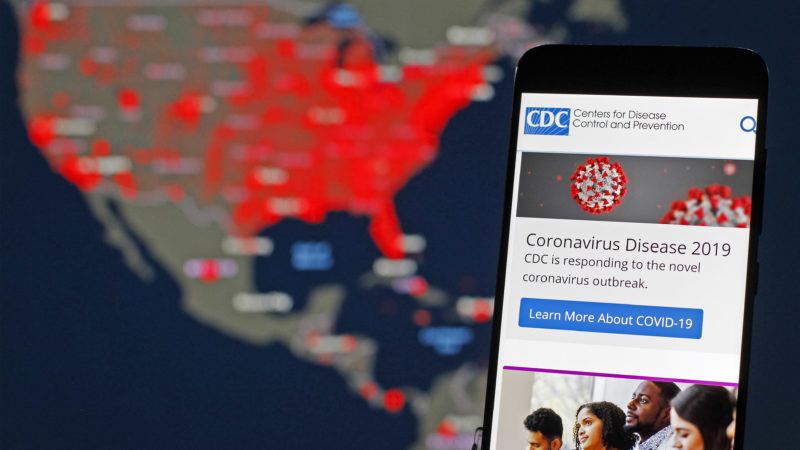As COVID-19 Approached, CDC Asked Congress for More Money To Fight the Drug War
Most of the items included in the CDC's 2021 budget request are important, serious matters. But many have nothing to do with the agency's mission.

Just two weeks after he'd tweeted that there was "no confirmed person-to-person spread" of the new coronavirus emerging from China, Centers for Disease Control Director Robert Redfield submitted to Congress a 512-page budget request asking for more than $7 billion in taxpayer money.
That document shines some light on the CDC's decadeslong problem with mission creep, which may have critically undermined the agency's ability to respond effectively to the pandemic.
Among other things, the CDC sought $100 million for its Drug Free Communities program and another $100 million for the Office of National Drug Control Policy, a federal agency that has repeatedly been on the budgetary chopping block because even its defenders don't seem to know exactly what value it provides.
As part of that funding proposal, the CDC told Congress that it planned to build on previous successes like "expanded efforts to partner with public safety (e.g., law enforcement, first responders) by collaborating with the Office of National Drug Control Policy to fund 25 pilot projects" aimed at reducing opioid overdoses. Another CDC project claimed to target "the stigma associated with opioid use disorder within the Native American culture."
Opioid abuse is a serious public health problem, of course, but it's worth asking whether the CDC is the appropriate agency for addressing it. After all, the CDC's mission statement says it seeks to "prevent, detect, and rapidly respond to disease outbreaks at their source," not that it serves as a clearinghouse for government spending on public health.
The same questions can be asked of many other aspects of the CDC's most recent budget request. In touting its recent successes, for example, the CDC highlighted how it raised awareness about neonatal dental care by advertising in Times Square. The effort generated "more than 6 million impressions," according to the budget request document, but did it help stop an viral outbreak? Similarly, the CDC's development of "a web‐based data visualization dashboard to explore 1.4 million workers' compensation claims in Ohio, creating a causation‐specific injury surveillance system using existing claims databases" might have been useful in some ways, but it hardly seems to qualify as preventing or detecting deadly diseases.
"In general, less is more with federal agencies," writes Chris Edwards, director of tax policy studies at the Cato Institue. "Federal mission‐sprawl often results in overlaps with state, local, and private activities, and it distracts federal leaders from their core responsibilities."
As I wrote earlier this week, the CDC's budget was roughly 14 times larger in 2019 than it was in 1987—even though overall government spending has increased only about 4.5 times in the same period. After looking through previous CDC budget requests, Edwards concludes that the agency's workforce has increased by 12 percent between 2010 and 2019.
Americans should be wondering if they are getting what they are paying for. The CDC fumbled the response to the coronavirus outbreak in several key ways—first by downplaying the seriousness of the disease, then by delaying the development of testing kits, and perhaps most crucially by developing tests that didn't work.
It's impossible to know if those mistakes could have been avoided if the agency had stuck to its original mission of combatting deadly diseases rather than straying into a wide field of public health issues, including everything from vaping to gun violence. If nothing else, trimming the CDC's budget would have kept it from duplicating similar research at the National Institutes of Health or elsewhere within the Department of Health and Human Services.
"Congress needs to go in and start directing where and how CDC can and cannot use its money," suggests Michelle Minton, a senior fellow at the free market Competitive Enterprise Institue, and the author of a recent report on the CDC's mission creep. "The CDC should be made to focus—since it is not going to do it on its own—on infectious and contagious diseases."
